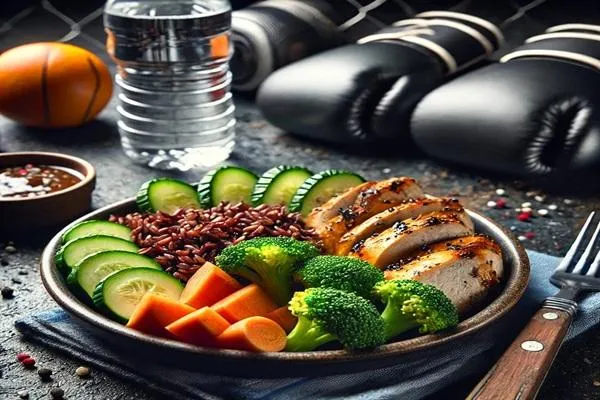
Fighter Diet and Meal Plans: Fueling Performance and Recovery
A fighter’s diet is as important as their training routine. Proper nutrition fuels intense workouts, aids recovery, and helps maintain optimal weight. Whether you’re preparing for a fight or looking to improve your overall fitness, a strategic meal plan is essential. Here’s a guide from Fighter’s Edge to help you build a diet that supports peak performance.
1. Prioritize Macronutrients
The right balance of macronutrients (carbohydrates, proteins, and fats) is crucial for energy, muscle repair, and overall health.
Breakdown:
Carbohydrates: Provide energy for high-intensity training. Opt for complex carbs like oats, brown rice, and sweet potatoes.
Proteins: Aid muscle recovery and growth. Include lean meats, eggs, fish, tofu, and legumes.
Fats: Support hormonal health and provide long-lasting energy. Choose healthy fats like avocados, nuts, seeds, and olive oil.
Fighter’s Edge Tip: Adjust your macronutrient ratio based on your training intensity and goals (e.g., higher carbs on sparring days).
2. Stay Hydrated
Dehydration can hinder performance and recovery. Fighters lose a significant amount of water during training, so replenishing fluids is essential.
Pro Tip:
Drink water consistently throughout the day.
Use electrolyte-rich drinks after intense sessions to restore sodium, potassium, and magnesium levels.
3. Plan Your Meals Around Training
Timing your meals properly ensures you’re fueled for workouts and recover quickly afterward.
Pre-Workout Meal (2-3 hours before):
Grilled chicken, brown rice, and steamed vegetables.
Greek yogurt with granola and a banana.
Post-Workout Meal (within 1 hour):
Protein shake with a handful of berries and spinach.
Salmon, quinoa, and roasted vegetables.
Fighter’s Edge Insight: Include a mix of protein and carbohydrates in post-workout meals to replenish glycogen stores and repair muscles.
4. Manage Weight Safely
For fighters cutting weight, gradual changes are safer and more sustainable than crash dieting. Focus on nutrient-dense foods to maintain energy while reducing calorie intake.
Sample Day for Weight Management:
Breakfast: Scrambled eggs, avocado, and a slice of whole-grain toast.
Lunch: Grilled chicken salad with mixed greens, olive oil, and lemon.
Snack: Handful of almonds and an apple.
Dinner: Grilled fish, quinoa, and roasted asparagus.
Pro Tip: Avoid excessive salt and sugar, which can lead to water retention or energy crashes.
5. Incorporate Superfoods
Superfoods are nutrient-dense and support performance and recovery.
Top Choices:
Spinach and kale: Rich in iron and antioxidants.
Blueberries: High in antioxidants to fight inflammation.
Chia seeds: Packed with omega-3s and fiber.
Sweet potatoes: Great for sustained energy.
Common Mistakes to Avoid
Skipping Meals: Leads to energy dips and affects performance.
Overeating Processed Foods: Reduces recovery efficiency and adds unnecessary calories.
Neglecting Recovery Nutrition: Delays muscle repair and glycogen replenishment.
Conclusion:
Fueling your body with the right diet is a game-changer for fighters. By prioritizing balanced macronutrients, staying hydrated, and timing meals around your training, you’ll optimize performance and recovery. Remember, consistency is key to long-term success.
*This article is for informational purposes only and not a substitute for professional advice. Consult a dietitian or nutritionist to create a plan tailored to your specific needs.
Join the Apex Community:
Stay tuned for more nutrition tips and meal plans at Fighter’s Edge. Whether you’re cutting weight or building muscle, we’re here to help you reach your peak potential.
